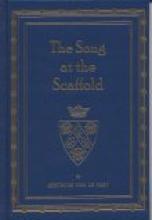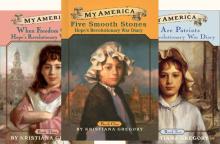18th century Historical Fiction
The Song at the Scaffold
This novelette, set at the time of the French Revolution, follows the lives of the nuns of the Carmelite convent at Compiegne during those troubled times, all the way to their martyrdom at the guillotine. Despite the rather short length, the novel is very deep and very moving. The author, rather than having the charcters preach to the reader, created a story which causes the reader to consider some very substantial spiritual issues – suffering, pride, fear, and how God works in our lives. Far from a depressing tale, we are shown how the Christian spirit becomes stronger in the face of great evil. However, we also see a warning note very applicable to our own times – that human nature alone is not sufficient and that when we abandon God and religion a very frightening and chaotic side of mankind can be revealed.
The story is quite valuable from an historical perspective – particularly as we view the French Revolution from a Catholic perspective. This book would be appropriate for high school (probably Junior or Senior year) and would be excellent for teens and parents to read together in order to discuss the many facets of the story.
The Wonderful Day
True to the Old Flag
Hope's Revolutionary War Diary
For young readers, this is an extremely well written account of the American Revolution. Written as a diary of a young girl, the book opens with Hope's family living with her relatives in Valley Forge. This quickly changes, however, when her family moves back to Philadelphia.
I like this book because it weaves interesting information about this period of time throughout the story, making it an educational read. Gregory not only portrays the drama and suspense of that period, but also accurately depicts the everyday occurrences and unusual habits in daily life. In the beginning, both Hope's father and brother are gone. When they return, she finds out the hardships they have gone through. Even though this is an educational book, it is easy to read and follows more than one interesting story line. In the beginning, for example, her brother has run away to join the army and no one knows how he is. She is also concerned about her father when he is gone. Will he return home? Then to make matters worse, her best friend is not allowed to talk to her, because her friend's family sympathizes with the other side. The family also has the unpleasant task of feeding and boarding some British soldiers. Will she accidentally reveal her sympathies?
The My America Series is shorter than the Dear Diary series also published by Scholastic. The complete story arc consists of three titles:
- Five Smooth Stones,
- We are Patriots, and
- When Freedom Comes




